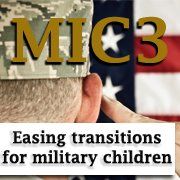http://mic3.net/index.aspxThe goal of the compact is to replace the widely varying policies affecting transitioning military students. The compact leverages consistency: It uses a comprehensive approach that provides a consistent policy in every school district and in every state that chooses to join. The compact addresses key educational transition issues encountered by military families including enrollment, placement, attendance, eligibility and graduation. Children of active duty members of the uniformed services, National Guard and Reserve on active duty orders, and members or veterans who are medically discharged or retired for one year are eligible for assistance under the compact What Are the Issues? Military families encounter school challenges for their children for enrollment, eligibility, placement and graduation due to frequent relocations in service to our country. What Is the Compact? The Compact provides for the uniform treatment of military children transferring between school districts and states. It was developed by The Council of State Governments' National Center for Interstate Compacts, the Department of Defense, national associations, federal and state officials, departments of education, school administrators and military families. How Does a State Join the Compact? Each state must adopt the Compact through their legislative process. Participation is voluntary. What Happens After a State Joins the Compact? Each state appoints representation to a governing commission responsible for enacting rules to implement the Compact. Each participating state also creates a state council based on the requirements of their state legislation. What Children Are Eligible for Assistance Under the Compact? Children of Active duty members of the uniformed services, National Guard and Reserve on active duty orders Members or veterans who are medically discharged or retired for (1) year Members who die on active duty What Children Are Not Eligible for Assistance Under the Compact? Children of Inactive members of the National Guard and Reserves Members now retired not covered above Veterans not covered above Dept of Defense personnel, federal agency civilians and contract employees not defined as active duty What Are Some of the Specific Educational Issues that the Compact Covers? Enrollment Educational Records Immunizations Kindergarten & First Grade Entrance Age Placement & Attendance Course & Educational Program Placement Special Education Services Placement Flexibility Absence Related to Deployment Activities Eligibility Eligibility for Student Enrollment Eligibility for Extracurricular Participation Graduation Waiving courses required for graduation if similar course work has been completed Flexibility in accepting state exit or end-of-course exams, national achievement tests, or alternative testing in lieu of testing requirements for graduation in the receiving state Allowing a student to receive a diploma from the sending school instead of the receiving school Who Do I Contact in my State or School District to Learn More About What Is and Is not Covered in the Compact? You should contact your State Compact Commissioner. Interactive Map of State Contact Officials Is There a Person at the Military Installation who can Help me Understand the Compact Issues and Requirements for Local School Districts? You should contact the School Liaison Officer at your local installation. For a listing of School Liaisons in your area, visit the Military K-12 Partners Web site. What Happens if the Member State does not Comply with the Compact? The Compact provides for a governance structure at both the state and national levels for enforcement and compliance. Where is the Compact in Terms of Implementation at the National and State Levels? Thirty Five states have adopted the Compact. The Department of Defense will continue to work with the Commission, Council of State Governments, national organizations, and state leaders to bring the remaining states on board. Member states are beginning to form their State Councils and inform school districts of the terms of the Compact. The Commission has met twice and is working to implement and communicate the requirements of the Compact.
